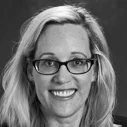Kimberly Applegate, MD, MS, FACR, is professor of radiology and pediatrics and director of practice quality improvement in radiology at Emory University in Atlanta, Georgia. She serves on the American College of Radiology Board of Chancellors, completing a 2-year term as the first woman to be elected ACR Council Speaker, and has chaired the ACR national guidelines. Dr Applegate is also the President of the Association for University Radiologists (AUR) Research and Education Foundation, a member of the National Quality Forum Patient Safety Committee, and both the National and the International Councils for Radiation Protection.
Kimberly has received a number of awards and enjoys mentoring talented colleagues and trainees. At the 2015 RSNA meeting, Kimberly received the American Association for Women in Radiology’s Marie Curie Award for her unique roles in leadership and outstanding contributions to the advancement of women in the radiology professions.
Dr. Applegate has published over 190 peer-reviewed papers and book chapters, and presented scientific papers and lectures at medical and scientific assemblies. She has an interest in health services research in radiology, co-editing the only evidence-based imaging textbook series. In 2006, she began work on the Steering Committee for the Image Gently Campaign to optimise radiation exposure in children worldwide. The campaign received a number of awards for its advocacy, education and collaboration to change imaging practice. She is also on the Executive Committees of the World Federation of Paediatric Imaging and Image Wisely. She and her husband, Dr. Parker, have three sons, David, and twins Andrew and Eric.
1. What are your key areas of interest and research?
Quality, safety and systems improvement, including radiation protection, policy, and clinical guidelines. Research interests include the study of safety events, radiation dose optimisation, and evidence based imaging of abdominal conditions in children.
2. What are the major challenges in your field?
All of medicine, including radiology, is grappling with rapid changes in practice, patient expectations and scientific knowledge. It is difficult for the health care worker to keep up with the uncoordinated demands of each stakeholder. In addition, the radiology profession faces unprecedented pressure to be more efficient at the potential costs of physician burnout, worker training gaps and patient safety. The radiology community will need to monitor these issues and communicate effectively to support our patients and each other so that we prevent these undesired outcomes.
3. What is your top management tip?
Articulate a common purpose for the team you lead. When individual team member goals conflict, go back to the common purpose or strategic plan to try to diffuse these individual conflicts.
4. What would you single out as a career highlight?
Mentoring talented women and men in their developing careers (medical school, training, junior faculty), has been a rich and rewarding experience. I have enjoyed watching them learn, teach me, and succeed in so many ways.
5. If you had not chosen this career path you would have become…
…astronaut, photographer, marine scientist.
6. What are your personal interests outside of work?
Walking in nature, in the woods; reading fiction and non-fiction; movies; being with friends.
7. Your favourite quote?
“The system is designed perfectly to get the results that it gets”, by Dr. Paul Batalden



